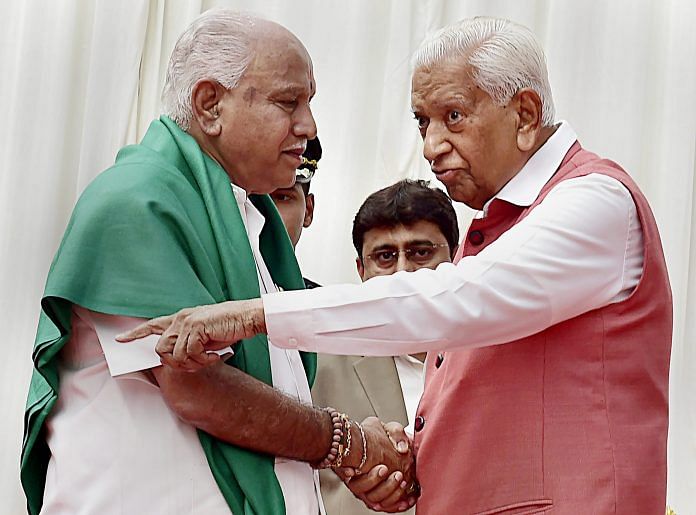Time and again, the role played by state governors in independent India has invited adverse comments from court and government-appointed commissions.
The burden of the complaints against the behaviour of governors, in general, is that they are unable to shed their political inclinations, predilections and prejudices while dealing with different political parties within the state. As a result, sometimes the decisions they take in their discretion appear as partisan and intended to promote the interests of the ruling party in the union government, particularly if the governor was earlier in active politics or intends to enter politics at the end of his term. Such behaviour, it is said, tends to impair the system of parliamentary democracy, detracts from the autonomy of the states, and generates strain in union-state relations.”
Strong words, indeed. These are the views of a five-judge bench of the Supreme Court while deciding Rameshwar Prasad versus Union of India (2006), where the actions of then-Bihar governor Buta Singh were under the scanner.
When a five-judge bench of the Supreme Court begins hearing the petition filed by Karnataka Congress chief G. Parameshwara and JD(S) leader H.D. Kumaraswamy Friday, challenging Karnataka governor Vajubhai Vala’s invitation to BJP legislature party leader B.S. Yeddyurappa to form the government, the focus will also be on the governor’s role. But, this won’t be the first time that a governor’s actions will be the subject of judicial scrutiny.
Adverse observations
There are several instances where courts and government-appointed commissions have commented on the manner in which governors have behaved, and/or the expectations that the framers of the Constitution had from governors in independent India.
The National Commission to Review the Working of the Constitution also dealt with the role of the governor, suggesting a roadmap to ensure that only non-partisan persons were appointed governors.
“The governor of a state should be appointed by the President only after consultation with the chief minister of that state. Normally, the five-year term should be adhered to and removal or transfer should be by following a similar procedure as for appointment i.e. after consultation with the chief minister of the concerned state,” the commission’s report said.
Sarkaria Commission
Even the Justice Sarkaria Commission dealt with the issue of who should be appointed governor.
A person being considered for appointment as governor should “be eminent in some walk of life”, the commission said. It then went on to list out the other parameters: He should be a person from outside the state; he should be a detached figure and not too intimately connected with the local politics of the state; and, lastly, should be a person who has not taken too great a part in politics generally, and particularly in the recent past.
Interestingly, the commission’s report also cited responses to its questionnaire “received from a cross-section of the public” to say that most were “critical of the quality and standard of some of the persons appointed as governors”.
“To summarise their comments — Discarded and disgruntled politicians from the party in power in the union, who cannot be accommodated elsewhere, get appointed. Such persons, while in office, tend to function as agents of the union government rather than as impartial constitutional functionaries… The number of governors who have displayed the qualities of ability, integrity, impartiality and statesmanship has been on the declining side,” it observed.
Talking about the use of discretion by governors, the commission said: “Where the governor is required to exercise his discretion, he should not only act in a fair, just and impartial manner but also seen to be acting as such.”
Punchhi Commission
The Justice M.M. Punchhi Commission, set up by the UPA government in 2007, also went into the issue of governors, their appointment and their discretionary powers.
On the issue of appointment, it also strongly favoured that the central government “adopt strict guidelines as recommended in the Sarkaria report and follow its mandate in letter and spirit lest appointments to the high constitutional office should become a constant irritant in Centre-state relations and sometimes embarrassment to the government itself”.
It also recommended a fixed five-year term for governors, saying “their removal should not be at the sweet will of the government at the Centre”. It, however, said a governor should be removed only through impeachment, adding: “The dignity and independence of the office warrants such a procedure”.
With regard to the governor’s discretionary powers, the Punchhi Commission said though Article 163(2) gave “an impression that the governor has a wide, undefined area of discretionary powers even outside situations where the Constitution has expressly provided for it”, the scope of discretionary powers should be narrowly construed so as to effectively dispel the apprehension that the discretionary powers “extend to all the functions that the governor is empowered under the Constitution”.
Significantly, even this commission deemed it necessary to lay down certain clear guidelines to regulate the actions of the governor in case of a hung assembly.
However, the guidelines have not been implemented and remain on paper only.



